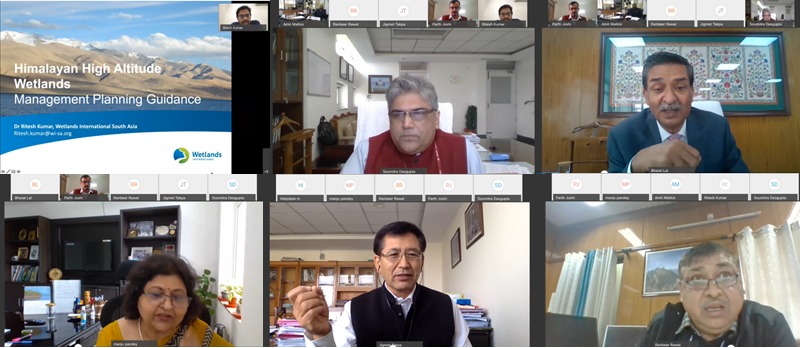
Call for adopting a Landscape Approach to Conservation of High-Altitude Wetlands at a Policy Dialogue held on 20 November 2020
-
Integrated management planning
A Policy Dialogue on Standard Operating Procedures (SOPs) on Integrated Management of High-altitude Wetlands (HAW) was organised virtually by the UNDP and Wetlands International South Asia on 20 November 2020. The event brought together government, research and conservation institutes and the academia to discuss and deliberate the ways in which these fragile ecosystems could be managed.

High-altitude Wetlands are wetlands located above elevations of 3,000 metres, and in India, they are present in the Himalayan and trans-Himalayan regions. HAWs sustain distinct biological diversity, including providing crucial habitats to a range of species, such as migratory birds which depend on these ecosystems to complete their annual migration cycles between the tropic and temperate regions. Ensuring that these wetlands are well conserved is critical for the health of many other ecosystems.
The dialogue began with an introduction and briefing about the context by Mr Parth Joshi, National Livelihoods Specialist (SECURE Himalaya), UNDP. This was followed by a comprehensive presentation on the SOPs for Integrated Management of HAWs by Dr Ritesh Kumar, Director, Wetlands International South Asia.
The keynote address was delivered by Shri Soumitra Dasgupta, Additional Director General of Forest (Wildlife), Ministry of Environment, Forest & Climate Change (MoEFCC) who asserted that a landscape scale management was needed to secure the values and functions of HAWs.
In his special address to the audience, Shri Bharat Lal, Additional Secretary (Water), Department of Drinking Water and Sanitation, Ministry of Jal Shakti urged the panel to view the issue from a user’s perspective. He remarked that one needs to understand people’s dependence on the wetlands ecosystem and factor in the socio-economic challenges that come in the way of sustainable management of this ecosystem. He called for proactive action at village level – as the Panchayats are front runners in developing and implementing village level development plans – including source water security. “Enable people to think on it, and invest in it” he stated.
This was followed by a special address by Smt. Manju Pandey, Joint Secretary (Wetlands Division), Ministry of Environment, Forest & Climate Change. Ms Pandey highlighted that much emphasis is being placed on diagnostic approaches for wetlands conservation, and mainstreaming wetlands in sectoral development planning.
Shri Jigmet Takpa, Joint Secretary (Desertification Cell), Ministry of Environment, Forest & Climate Change called for taking into account uniqueness of each wetland, and making management interventions only when they are needed and based on robust ecological evidence.
The second part of the consultation saw a panel discussion with an esteemed set of stakeholders who provided their suggestions and feedback on the SOPs. The panel discussion was moderated by Dr. Ritesh Kumar. The panellists included Dr. Amit Mallik, Inspector General of Forests, Wildlife, MoEFCC, Dr. R.S. Rawal, Director, G.B. Pant National Institute of Himalayan Environment & Sustainable Development and Prof. Syed Ainul Hussain, representing the Wildlife Institute of India. Dr Rawal made a call for systematizing available science base on wetlands as a basis for a regional programme.
Wetlands International South Asia will be following up the discussions with revisions of the SoP and placing the same in public domain by the World Wetlands Day of 2021.
